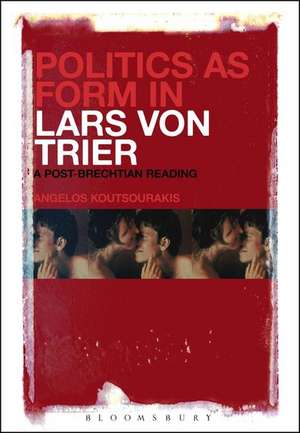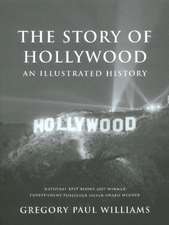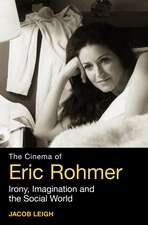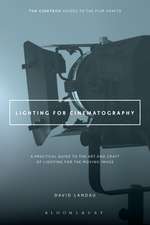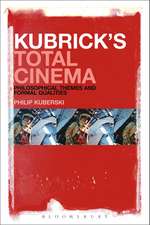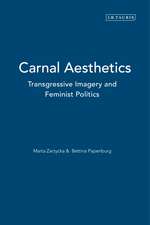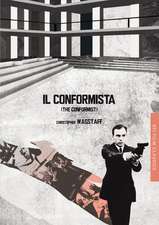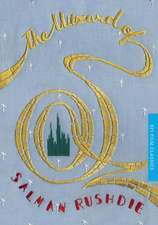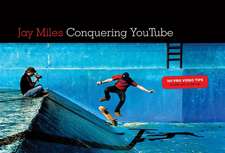Politics as Form in Lars von Trier: A Post-Brechtian Reading
Autor Dr Angelos Koutsourakisen Limba Engleză Paperback – 17 iun 2015
| Toate formatele și edițiile | Preț | Express |
|---|---|---|
| Paperback (1) | 218.91 lei 6-8 săpt. | |
| Bloomsbury Publishing – 17 iun 2015 | 218.91 lei 6-8 săpt. | |
| Hardback (1) | 831.83 lei 6-8 săpt. | |
| Bloomsbury Publishing – 18 dec 2013 | 831.83 lei 6-8 săpt. |
Preț: 218.91 lei
Preț vechi: 245.40 lei
-11% Nou
Puncte Express: 328
Preț estimativ în valută:
41.89€ • 43.97$ • 34.77£
41.89€ • 43.97$ • 34.77£
Carte tipărită la comandă
Livrare economică 10-24 aprilie
Preluare comenzi: 021 569.72.76
Specificații
ISBN-13: 9781501307690
ISBN-10: 150130769X
Pagini: 264
Ilustrații: 25 bw illus
Dimensiuni: 152 x 229 x 20 mm
Greutate: 0.41 kg
Editura: Bloomsbury Publishing
Colecția Bloomsbury Academic
Locul publicării:New York, United States
ISBN-10: 150130769X
Pagini: 264
Ilustrații: 25 bw illus
Dimensiuni: 152 x 229 x 20 mm
Greutate: 0.41 kg
Editura: Bloomsbury Publishing
Colecția Bloomsbury Academic
Locul publicării:New York, United States
Caracteristici
Contains a personal interview with Lars von Trier, covering politics and aesthetics
Notă biografică
Angelos Koutsourakis is the author of Politics as Form in Lars von Trier (Bloomsbury, 2013, 2016) and the co-editor of The Cinema of Theo Angelopoulos (2015). His work has appeared in Cinema Journal, Film Criticism, SubStance: A Review of Theory and Literary Criticism, Monatshefte für deutschsprachige Literatur und Kultur, New Review of Film and Television Studies, Journal of Contemporary European Studies, Image and Narrative, Studies in European Cinema, Cinema: Journal of Philosophy and the Moving Image, and many more.His next book Rethinking Brechtian Film Theory and Cinema (2018).
Cuprins
Preface and AcknowledgementsNotes to the TextForeword: Looking Back 1. From Brechtian to Post-Brechtian Cinema. Lars von Trier and the Post-Brechtian Brecht on the Film MediumBrecht's Critique of the Institution of CinemaWhat is Post-Brechtian Cinema?Locating von Trier in the post-BrechtianChallenging the Cinematic InstitutionArtaudian Cruelty as Verfremdungseffekt 2. Historical Fragments in the Europa Trilogy Europe is PainfulBeyond the FabelAudiovisual Plenitude: the Individual in Crisis Dialectical Images Literalization of the Medium: the Essay as FormHistory as TransitionOn Film Voyeurism 3. The Primacy of the ApparatusBack to the 1970s? Dogme 95 Realism and Anti-Illusionism Technology and ProductivityThe Idiots: Performant Function and Performative CameraInterrupting the NarrativePerformance as FormCharacters as Bodily EffectsPerforming out of CharacterReflections on the Primacy of the Apparatus: Post-Dogme Developments, Rules and Automavision 4. Dogville and Manderlay: Experimentation and Dialectical NegationsRepresentation as an ExperimentExperimentation as PedagogyTheatricality: Attitudes in SpacePerformative ContradictionsNarrative Openness as Negative DialecticsEpilogue: Dialogue with the 'Dissensual' PastAppendix:Interview with Lars von TrierInterview with Jørgen LethManifestos Filmography and BibliographyIndex
Recenzii
Koutsourakis's examination of the often-examined Lars von Trier is refreshing for a couple of reasons. First, Koutsourakis (research fellow, Centre for Modernism Studies, Univ. of New South Wales, Australia) foregoes biographical attention to von Trier the man in the interest of restoring focus on the formal complexities of the films themselves. Second, Koutsourakis interprets the films through a postmodern rethinking of Bertolt Brecht, and he dedicates the first chapter, 50 pages or so, to Brecht and defining "post-Brechtian"--which should interest scholars of theater, performance studies, and contemporary cinema. The book is strongly argued and will prove useful to those interested in von Trier. Summing Up: Recommended. Upper-division undergraduates through faculty.
[Koutsourakis] contributes generatively to the way in which Brecht might be applied within film studies as he evaluates Brecht's own writing on cinema and illuminates concepts beyond the Verfremdungseffekt (the process of making the familiar strange). Koutsourakis' book is thus a welcome development that expands scholarship on von Trier beyond the framework of 'Extreme Cinema' within which his work is frequently placed ... A highly valuable contribution to work on von Trier.
From Brechtian to Post-Brechtian: Koutsourakis moves beyond the mere allegorical readings of the films' content and challenges the simplistic dichotomies that traditionally [restricted] von Trier's Brechtianism [...] Unlike other books on von Trier . . . this richly illustrated study pushes the analysis to reveal von Trier's multiple connections with the avante-garde and Italian Neo-Realism, also including interviews with the director and his mentor Jorgen Leth.
Koutsourakis's study succeeds in two ways. It identifies the political dimension of Brecht's artistic practice not in his Marxist ideology or modernist devices but in his aesthetics of negation. Second, it positions von Trier in this tradition as a post-Brechtian filmmaker whose experimental and irritating productions - like Brecht's - politicize the audience's perception of history and the present through their formal properties of radical negation. Unlike many books on von Trier, this richly illustrated study, including interviews and relevant documents, pushes far beyond the biographical into the media and representational aesthetics that distinguish this body of challenging films.
In his book, Angelos Kousourakis takes a new and innovative look at the cinema of Lars von Trier. Using Bertolt Brecht's theories as a key, he analyses the political and ideological aspects of Lars von Trier's oeuvre with sharp intellectual energy. In Koutsourakis's reading, Trier's radicalism is made visible: Lars von Trier as a revolutionary!
Angelos Koutsourakis's stimulating and thought-provoking monograph on Lars von Trier presents the Danish director as a political filmmaker in the Brechtian tradition. In addition to offering a sophisticated and stimulating analysis of the political aspects of Lars von Trier's films, the monograph also has a number of other qualities that make it an essential read for anyone interested in Lars von Trier. It revalorises von Trier's early films and discusses a number of his lesser-known projects (such as the unfinished, and now aborted, Dimension project); it introduces material to which only Danish readers have previously had access, and it includes Koutsourakis's own interviews with Lars von Trier and Jørgen Leth. Finally, like Bainbridge, Koutsourakis presents a number of von Trier's manifestos from 1984 to 2001, giving the reader a lot of material to engage with -dialectically or not.
[Koutsourakis] contributes generatively to the way in which Brecht might be applied within film studies as he evaluates Brecht's own writing on cinema and illuminates concepts beyond the Verfremdungseffekt (the process of making the familiar strange). Koutsourakis' book is thus a welcome development that expands scholarship on von Trier beyond the framework of 'Extreme Cinema' within which his work is frequently placed ... A highly valuable contribution to work on von Trier.
From Brechtian to Post-Brechtian: Koutsourakis moves beyond the mere allegorical readings of the films' content and challenges the simplistic dichotomies that traditionally [restricted] von Trier's Brechtianism [...] Unlike other books on von Trier . . . this richly illustrated study pushes the analysis to reveal von Trier's multiple connections with the avante-garde and Italian Neo-Realism, also including interviews with the director and his mentor Jorgen Leth.
Koutsourakis's study succeeds in two ways. It identifies the political dimension of Brecht's artistic practice not in his Marxist ideology or modernist devices but in his aesthetics of negation. Second, it positions von Trier in this tradition as a post-Brechtian filmmaker whose experimental and irritating productions - like Brecht's - politicize the audience's perception of history and the present through their formal properties of radical negation. Unlike many books on von Trier, this richly illustrated study, including interviews and relevant documents, pushes far beyond the biographical into the media and representational aesthetics that distinguish this body of challenging films.
In his book, Angelos Kousourakis takes a new and innovative look at the cinema of Lars von Trier. Using Bertolt Brecht's theories as a key, he analyses the political and ideological aspects of Lars von Trier's oeuvre with sharp intellectual energy. In Koutsourakis's reading, Trier's radicalism is made visible: Lars von Trier as a revolutionary!
Angelos Koutsourakis's stimulating and thought-provoking monograph on Lars von Trier presents the Danish director as a political filmmaker in the Brechtian tradition. In addition to offering a sophisticated and stimulating analysis of the political aspects of Lars von Trier's films, the monograph also has a number of other qualities that make it an essential read for anyone interested in Lars von Trier. It revalorises von Trier's early films and discusses a number of his lesser-known projects (such as the unfinished, and now aborted, Dimension project); it introduces material to which only Danish readers have previously had access, and it includes Koutsourakis's own interviews with Lars von Trier and Jørgen Leth. Finally, like Bainbridge, Koutsourakis presents a number of von Trier's manifestos from 1984 to 2001, giving the reader a lot of material to engage with -dialectically or not.
